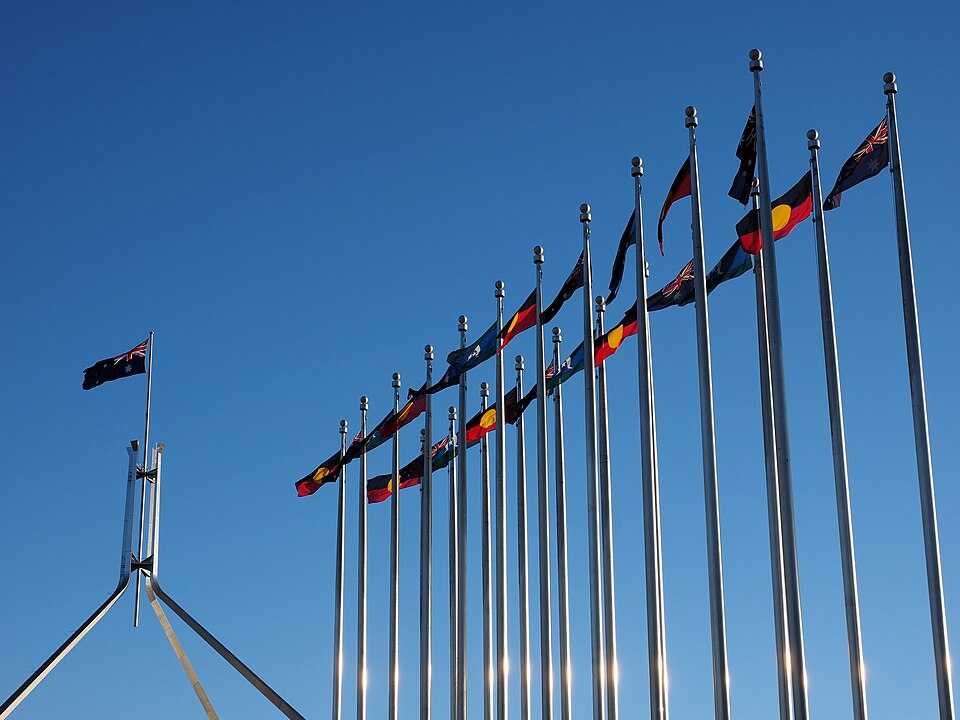Reinitiating the foreign agents’ law, the Georgian Dream government triggered a political crisis tearing the country between Russia and Europe, and authoritarianism and democracy. Critique of external partners, fierce protests against civil society, and the fears of undecided voters, however, remain unaddressed as the decisive 2024 elections approach.
Is Georgia abandoning its decades-long, pro-Western foreign policy and turning to Russia? This question sounds rather surreal for most Georgians, but the recent events demonstrate that the country is at a crossroads. One path is authoritarian, leading to stronger relations and integration with Russia, and the other is a path toward democracy and the European Union (EU). This situation is a result of the government of Georgia reintroducing the so-called “Russian law”—a law on Transparency of Foreign Influence. A similar bill labelling civil society organisations and media who receive at least 20 percent of their income from a “foreign power” as “agents of foreign influence” was initiated a year ago. However, after large-scale demonstrations it was withdrawn. In March this year, the bill returned with a single change: the word “agent” was replaced with an essentially equally derogatory term, “bearer of the interests of a foreign power.”
Foreign powers include any foreign government, a physical person who is a foreign citizen, a legal entity or other types of organisations that are established under foreign legislation; in other words, outside Georgia. The law allows the government to conduct “monitoring” of such organisations based on a decision of the Ministry of Justice or an anonymous tip once every six months. Under monitoring, the government can access any information apart from state secrets including the personal data of physical persons, such as sexual life, medical data, political views, and religious or ethnic identity connected to the organisation.
The law has been severely criticized and massive demonstrations have taken place, some of which were unprecedented not only because of their scale but also because of the lack of established politicians managing and leading the protests. Demonstrations that have been continuing almost daily since March have been self-organised by the activists as there is little trust towards political parties and their leaders among the population, especially the young generation. Yet, the parliament has passed the law with three hearings and is now poised to overcome the presidential veto, risking further radicalisation of the activists and splitting the society with affective polarisation.
International reactions
The law is clearly aimed at discrediting critics of the government and limiting their rights and freedoms. Therefore, it undermines basic principles of democracy and will likely strengthen the current government’s grip on power. Undermining democracy, in its turn, puts Georgia’s EU integration prospects at risk. With this move, the government of Georgia and the ruling party— Georgian Dream (GD)—have met unprecedented criticism from Georgia’s European and American partners, even facing sanctions from the US government. EU officials have declared repeatedly that the law is incompatible with EU legislation and not only will prevent the opening of accession negotiations with Georgia, but also may trigger a reconsideration of Georgia’s visa-free regime and the candidate status of Georgia.
As a result, Georgia will find itself in a situation where isolation from Western partners will push the country towards Russia by leaving Tbilisi alone with Moscow. It must be noted that Russian officials have expressed their full support for this law and, considering that the Georgian version is modelled on the Russian law and has similar goals, it has been labelled a “Russian law.” Furthermore, given the trajectory of the similar law in Russia, it is likely that the Georgian version will become a foundation for the further breach of human rights and freedoms. The more the Georgian government moves towards authoritarianism the more it risks isolation from Western partners and the closer its interests will align with those of Vladimir Putin’s regime. Therefore, it should be expected that authoritarian governments with similar interests of keeping power will increasingly support each other.
The GD rhetoric: Playing with voters’ fears
The adoption of the law is especially problematic in the context of the upcoming parliamentary elections in October 2024. The honorary chairman and the shadow ruler of Georgia, billionaire Bidzina Ivanishvili, stated on 29 April at a government-organised rally that it was his idea to re-initiate the law, noting that demonstrations will eventually peter out. By the time the parliamentary elections take place, there will be little momentum for protests, guaranteeing GD a victory. Accordingly, this law is not about transparency, as the GD politicians want people to believe, but about maintaining power. The Russia-EU dimension in this case is not the primary nexus of conflict but a mere manifestation of a deeper division. The law is not about foreign policy ideals. Instead, it is about how political life should be organised in Georgia: whether Georgia should be a democracy or an autocracy.
The next elections in Georgia will be held with a proportional vote system as the single-mandate districts were abolished following the elections of the 2020. In proportional systems, voters all over the country choose their preferred political party, which has already submitted a closed list of candidates to the election administration. The parliamentary mandates are then distributed proportionally among those parties that overcome the electoral threshold. Voters can choose a representative of their own district from a pool of candidates, and the system is winner-take-all. Such systems emphasise the importance of individual politicians and their characteristics as well as the social capital they possess, which in a semi-democratic context can turn into clan-like networks. Traditionally, the single-mandate districts were the stronghold of ruling parties in Georgia, giving the incumbent regimes an unfair advantage. The GD, under these changes, felt threatened prior to the elections and subsequently turned to the new law to silence the critics. Although they risk the radicalisation of a significant part of the electorate, the increased affective polarisation is likely to equally mobilise their own supporters through fear-mongering rhetoric.
Furthermore, GD, with this law and the accompanying narrative, has created a new image of the enemy that seems to be rather effective among its own supporters and even among undecided voters. The rhetoric has three main pillars. Firstly, the government claims that the “network of foreign agents,” for instance the civil society, is funded with “black money” and is attempting a revolution in Georgia; with similarities to the Ukrainian Euromaidan in 2013 proffered. The alleged goal of this revolution is to drag Georgia into a war with Russia. Secondly, GD claims that these “foreign agents” are mere puppets of external donors who flood Georgia with money. Although the government has not directly blamed the donors, such as the EU and USAID, they are implied as they represent the largest funding organisations in Georgia. Finally, the incumbent claims that there is a “Global War party,” which by some MPs has been likened to “Free Masons,” exerting influence over and manipulating EU and US officials. This Global War Party, GD alleges, wants to start a war between Georgia and Russia. The background of all these three pillars is, of course, the main opposition party United National Movement, who held power between 2004 and 2012.
The cornerstone of these pillars is a fear of war and a rather flexible image of an enemy. Given that no reasonable person wishes for war, it has proved easy for GD to create a faceless and intangible entity, which, should GD lose power, surely bring war to Georgia. Although some voters may not fully believe the rhetoric, they are aware of the West-Russia conflict and are genuinely scared of the possibility of war. Many Georgians retain strong memories of the Cold War and, even if they may not think that a new government will start a war, they are certainly afraid that Russia may seek to punish the Georgians for trying to escape the Kremlin’s influence. Russia’s full-scale invasion of Ukraine stands as a testament to this fear. Therefore, the victims of GD’s rhetoric are those whose feelings and good intentions are being manipulated with half-truths by what the government is telling them.
With conspiracy theories and surreal rhetoric, as well as political repression, threats, and brute force against opponents, GD aims to strengthen its grip on power. This makes the 2024 parliamentary elections almost a referendum for the Georgian people to make their choice on whether they want a democratic and European Georgia or whether they can tolerate Russian-style authoritarianism in their country. The next five months will be decisive, and many anxiously await what the outcome will be, even despite the unfair and unfree field of political competition.
Dr Levan Kakhishvili is a Postdoctoral Researcher at the European Politics Research Group at ETH Zurich, Switzerland. He wrote his doctoral dissertation about party competition in Georgia at the University of Bamberg, Germany and was educated at the University of Oxford and Tbilisi State University.
This article is published under a Creative Commons License and may be republished with attribution.



